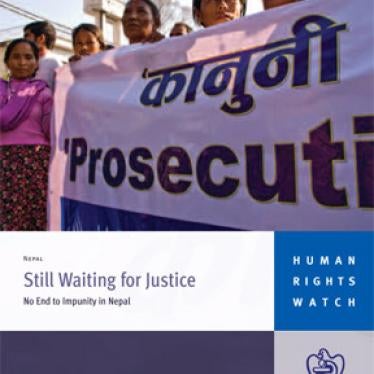(London) - The UK government should publicly call on Nepal's chief of army staff, Gen. Chhatraman Gurung, to ensure that the army cooperates with investigations into crimes committed during Nepal's armed conflict, Human Rights Watch said today. In particular, the UK government should press General Gurung, to order the immediate transfer of Maj. Niranjan Basnet, charged with the 2004 murder of 15-year-old Maina Sunuwar, into police custody to ensure that he is held accountable through civilian criminal proceedings, Human Rights Watch said.
Gen. Chhatraman Gurung will be visiting the UK for four days starting October 4, 2010.The UK provides military assistance to Nepal, including support to a peacekeeping training center at Panchkal, where 15-year-old Maina Sunuwar was tortured and killed in 2004. The UK government has made attention to human rights and the rule of law a priority in its training and bilateral support to Nepal. However, dozens of Nepal army officers, including Maj. Basnet and another soldier charged with Maina's murder, had received training at Sandhurst military academy in the UK.
"The Nepal Army has a deplorable human rights record and has consistently failed to allow perpetrators of abuse to be prosecuted." said Meenakshi Ganguly, South Asia director at Human Rights Watch. "If the UK wants to help Nepal's army to be professional and rights-respecting, then British officials should press the army to rein in impunity, and show that commitment by handing Major Basnet over to the civilian authorities."
Human Rights Watch said that not a single perpetrator has been brought to justice before a civilian court for grave human rights violations during the country's conflict.
Maina Sunuwar was arrested and then "disappeared" in February 2004. Police in Kavre District registered a complaint in November 2005 only after considerable national and international pressure. But slow action by police in the process of identifying and verifying human remains has hampered investigations. In July 2008, DNA test results finally confirmed that human remains found buried at the Panchkal army camp were Maina's. Despite a January 2008 court order issuing summons for the arrest of four accused army officers, none of them have been arrested.
According to Col. Bobi Khatri, the officer in charge who is also accused in the Maina Sunuwar case, two officers, Capt. Amit Pun and Major Basnet were involved in the interrogation. In his testimony to the military court, Colonel Khatri specifically referred to the training at Sandhurst. "I felt that whatever they were doing was only to frighten her," he said. "And also, I had confidence in these two officers because of the fact that they were qualified in that they had received Sandhurst training."
The UN returned Major Basnet, who had been serving as a peacekeeper in Chad, to Nepal on December 13, 2009, after the UN discovered that the Kavre District Court, in January 2008, issued an arrest warrant for Major Basnet and three others involved in the illegal detention, killing, and torture of Maina Sunuwar. While the other three accused have retired or left the army, Major Basnet remains in active military service. Upon his return, the army, which has previously defied court orders and shielded Major Basnet from prosecution, took him under its control.
In July, the army announced that he was "innocent" and had been returned from the UN mission "against all international norms and regulations." However, in his own statement during military investigations into Maina Sunawar's death, Major Basnet has admitted that he was party to the illegal detention and interrogation of a minor. Other eyewitness evidence has confirmed Major Basnet's participation in the torture and interrogation of Maina.
"The Nepal Army has shown contempt for international standards, by first failing to punish Major Basnet, and sending him instead on a peacekeeping mission," Ganguly said. "The UK should make it clear that the Nepal Army cannot openly defy court orders and be rewarded with more foreign training."
The Basnet case is not the only one recently brought to the attention of the UK. Human rights activists criticized a February meeting between the British army chief, Gen. Sir David Julian Richards, and the Nepal Army's Lt. Gen. Toran Jung Bahadur Singh, who himself is allegedly involved in human rights violations. In March, the British ambassador to Nepal, Andrew Hall, said that "the obstruction" in due process "will inevitably have an impact on our ability to conduct the normal relationship which we would like to enjoy."
During his visit, however, General Gurung is expected to ask for more support for the Nepal Army including increased training and military assistance.
"In light of the Nepal Army's persistent failure to address international concerns over its human rights record, General Gurung should receive clear instructions from the UK about how to make progress on emblematic cases like that of Maina Sunawar," Ganguly said. "More military assistance without progress on accountability will simply erode the rule of law and strengthen impunity."







